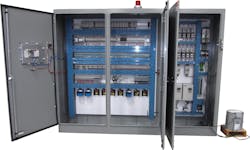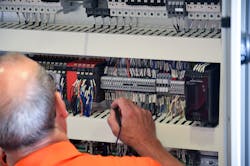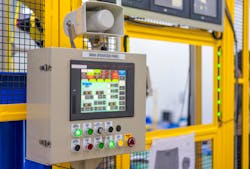What’s the difference between an automation distributor and a system integrator?
Components don’t just grow on trees. They’re manufactured and then distributed through a variety of channels. Some channels come with added expertise, integration capabilities and after-sales support for specific product lines. Others offer the choice of products from multiple manufacturers, which can be especially helpful, given the backlog of orders still unfilled because of the aftereffects of the pandemic and the global chip shortage.
But not all integrators are the same. And distributors vary in what they can provide. Each component provider has a distinct business model that has been shaped over time. And the line that separates automation distributors and system integrators has blurred to a point where one bleeds into the other, depending on who you ask.
“Distributors and system integrators come in all shapes and sizes with varying capabilities,” says Todd Majors, PE, industry engineering leader at Hargrove Controls & Automation, a certified member of the Control System Integrators Association (CSIA) in Mobile, Alabama. “This can make it difficult for end users to know who to call, but inherently they serve two different purposes while sharing some similarities.”
A distributor typically offers components and can provide solutions to end users on a smaller scale, explains Majors. “They also provide highly specific training opportunities on equipment and are typically the first to bring new products to light for end users, helping them understand how these new products will replace existing equipment and bring value,” he says. “Distributor relationships with end users are valuable for staying up to date on the latest technology, educating existing personnel and locating the parts needed to implement a project, particularly small projects normally executed in-house by end users. The distributor has a deep direct link to the control-system-platform vendor and the system integrator.”
System integrators offer the ability to combine full-lifecycle project services, identify and procure equipment, and evaluate control-system platforms to help the end user understand the best choice for their application, says Majors. “Most of the time, this is a more holistic approach that provides end users with the big picture for their potential project and the full suite of services needed to execute the project,” he explains. “System integrators also offer training at a system level with the ability to integrate distributor training for more detail. System integrators service everything from adding one new point in a system to planning and implementing greenfield plant installations, typically when partnered with an engineering, procurement, construction (EPC) firm.”
Both ends of the same spectrum
The difference between an automation distributor and a system integrator was much clearer a few years ago, as we increasingly see evolution in the automation world, notes Jason Andersen, vice president, strategy and business line management, Stratus Technologies in Maynard, Massachusetts. “Big drivers of this evolution include the rapid introduction of so many new digital technologies and the associated IT infrastructure required to support it,” he explains. “The difference lies in the level of solution customization that is required. If an organization is looking to do something fairly canned from a single trusted vendor, distributors are often a great fit and, in many ways, can act as a general contractor if they do not have the skills in house. However, if a company requires more customization, that really promotes the need for systems integrator involvement.”
Sam Hoff, chief executive officer at Patti Engineering, a CSIA-certified member with its corporate office in Auburn Hills, Michigan, cites two distinctions. “While the distributor can have very talented engineers on staff, they typically do not focus on project management,” he warns. “Good system integrators are differentiated by their ability to lead complex projects. A distributor is going to lead with the products they sell, while good system integrators will look at all products available to find the best solution.”
The value-adds of engineering and commissioning services are the differentiator between a distributor and the integrator, says Jeff Sanders, B.S.M.E., system integration manager at George T. Hall, a certified CSIA member, headquartered in Anaheim, California. “Oftentimes, our organization has more of the real-world experience or field experience than the distribution channel, and we are seen as a trusted partner of the distributor to see the projects through startup,” he emphasizes.
“Integrators build the machines or the systems,” explains Tobey Strauch, an independent principal industrial controls engineer based in Fremont, California. “Integration is simply the act of putting separated parts or systems together into a new combined machine or system. Integrators get paid to do this because they have resources that manufacturing companies do not. This means that there are as many types of integrators as the equipment on the plant floor. Distributors provide the tools that integrators use.”
Strauch distinguishes automation distributors as what she calls, “wholesellers” or “resellers,” as distributors are normally affiliated with a brand or group of brands with whom they’ve established a supply-chain relationship, she says. “With that said, a distributor may have the capacity to do integration. This can be broken down in many ways, depending on the business model.”
In England, an automation distributor will sell automation parts—programmable logic controllers (PLCs), human-machine interfaces (HMIs), robots, cobots—to a customer who will then install and program as required for the situation, explains Mark Lee, CHP technical manager at Prinovis, a print service provider in Liverpool. “A system integrator will source the parts, attend site, do the install and program the equipment,” he says. “It all depends on the site’s technical skills and the application, as to whether you buy parts from an automation distributor and do a self-install and program or you need the technical skills or even just the experience of a system integrator.”
“While some automation distributors have a services arm to their business, the bulk of their profits and focus is on supporting their hardware and equipment sales,” says Heath Stephens, PE, digitalization leader at Hargrove Controls & Automation. “This means that their services are in place to better support the hardware lines that they stock. Their knowledge, experience and training are all based on the product lines they carry. Automation distributors are also typically region-locked by their distribution agreements, so they may not be able to support multiple customer locations.”
On the other hand, system integrators usually do not have these vendor restrictions and have a higher degree of independence, explains Stephens. “Their primary revenue is from services,” he says. “However, it is important to choose a system integrator with the right platform experience for your solution, good relationships with their distributors, and the manpower and location that fits your needs.”
The role of the automation distributor is to ensure all the products needed to complete the automation system are available for delivery to ensure the project of building out the automation system is completed on schedule, explains Daniel Weiss, product segment lead—industrial, Newark, an Avnet company based in Chicago. “The automation distributor is a resource to supply upgrades to components within the automation system. The system integrator brings together component subsystems into a whole and ensures that those subsystems function together and even ensures the software is fully operational,” he says.
“Distributors focus more on inventory management and business engagement with customers,” says Joseph Yang, director of product management at Advantech, a Taiwanese company with U.S. offices in California, Illinois, Ohio and Massachusetts. “Integrators focus on project implementation and solution-bundle selling.”
A system integrator is a company that works with the customer to create a solution from concept to turnkey, says Eric Halvorson, partnership marketing manager—strategic programs, at Digi-Key Electronics, which is headquartered in Thief River Falls, Minnesota. “The system integrator will interview the customer and evaluate their needs, which results in the design, build and installation of a customized solution,” he explains.
An automation distributor assists the system integrator by providing inventory to help build that customized solution, continues Halvorson. “The distributor will manage supply chain concerns, data consolidation and logistics, which allows the system integrator to focus on servicing the customer and design,” he says.
“An automation distributor is sales-focused with services sufficient to meet product sales targets, provide first-level technical support on products and develop and maintain a growing customer base,” explains Dave Hellyer, vice president, business development, Tatsoft, a CSIA partner member headquartered in Houston. “While a system integrator is focused on delivering, maintaining, teaching and supporting systems to meet or exceed the end-user expectations, there can certainly be nuance throughout, but in general, I have found this to be true.”
The services offered to a customer by an automation distributor and a system integrator may have some overlap, but each party tends to focus on different parts of the customer project, explains Corey Engel, application engineer at Automation24, a German distributor whose U.S. headquarters is in King of Prussia, Pennsylvania. “An automation distributor will oftentimes work with a system integrator, or sometimes directly with the end customer, during the initial project-planning and design stages to help with component sizing, selection and logistics—availability, pricing, ordering,” he says. “A system integrator provides on-site field services such as control-panel design and fabrication and control-system architecture layout and programming.”
Both parties may be involved with commissioning or post-construction troubleshooting, with the automation distributor usually assisting with component-specific setup and troubleshooting, while the system integrator takes a more holistic system focus, explains Engel. “Since automation distributors rarely provide on-site support, they usually provide remote support via phone or email,” he says. “On the contrary, a system integrator will often provide several follow-up visits to a customer site long after project completion in order to provide troubleshooting support or system enhancements.”
A distributor will help source industrial equipment, explains Freeman Smith, founder of Nufactur, a distributor clearinghouse based in Naperville, Illinois, and they will even provide value-added technical expertise and basic system design, but ultimately the end user is responsible for the components they select. “A system integrator is selling you on a full system, from sizing to installation and even maintenance. Integrators ensure you have a functioning system,” he notes.
“There are several differences between these entities,” says Lane Lanford, category marketing manager at RS. “In general, automation distributors provide product and system design input but not system design, panel building, programming, installation or commissioning. System integrators provide those services. In many cases, the automation distributor and system integrator will partner together to provide the end user with the optimal system for their needs.”
About the Author
Mike Bacidore
Editor in Chief
Mike Bacidore is chief editor of Control Design and has been an integral part of the Endeavor Business Media editorial team since 2007. Previously, he was editorial director at Hughes Communications and a portfolio manager of the human resources and labor law areas at Wolters Kluwer. Bacidore holds a BA from the University of Illinois and an MBA from Lake Forest Graduate School of Management. He is an award-winning columnist, earning multiple regional and national awards from the American Society of Business Publication Editors. He may be reached at [email protected]





